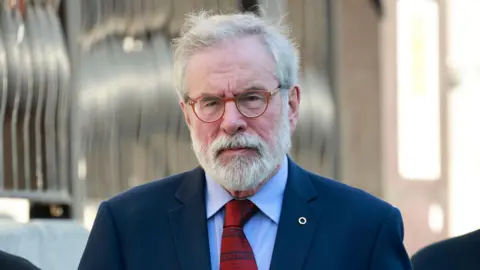The ongoing libel case involving Gerry Adams, the former president of the Sinn Féin party, has brought attention to significant allegations stemming from a BBC Spotlight program. Adams has publicly expressed his outrage following the BBC’s response to his complaint regarding accusations that he sanctioned the murder of Denis Donaldson, a noted informer, back in 2006. The case, being heard at the High Court in Dublin, places a spotlight on the intersection of journalism, reputation, and the enduring political ramifications of Northern Ireland’s troubled past.
Adams, now 76 years old, is seeking damages from the BBC for what he considers defamatory claims made in the program and its accompanying online article. These allegations assert that he endorsed the murder of Donaldson, an assertion that Adams vehemently denies. In his testimony, which has entered its third day, he described the BBC’s handling of the situation as “absolutely insulting” and “arrogant.” His comments underscore a broader tension between media narratives and the reputations of public figures, particularly in the context of contentious historical events in Ireland.
The legal proceedings have been marked by the presentation of evidence, including correspondence between Adams’ legal team and the BBC. Adams’s solicitors have argued that the claims made in the program are not only unfounded but were also purportedly crafted with malicious intent. They requested an apology and compensation, suggesting that the allegations were sensationalistic, aimed at generating ratings at the expense of Adams’s reputation. They pointed to a particular article still available on the BBC website, glaringly headlined “Gerry Adams ‘sanctioned Denis Donaldson killing,'” as a primary point of contention.
The BBC, however, has stood by its journalistic practices. The corporation’s legal representatives defended the integrity of the program, maintaining that it adhered to responsible journalism and the organization’s editorial guidelines. They dismissed Adams’s calls for remedies, asserting that the coverage was a reflection of a matter of public interest that was handled with due diligence.
Adams himself expressed frustration not only at the unfounded allegations but also at the BBC’s apparent dismissal of his attempts to resolve the matter outside of court. While detailing his response to Donaldson’s murder, Adams stated that he condemned it “without reservation,” emphasizing that the act was committed by individuals violating the peace process. The murder, claimed by the Real IRA in 2009, is a direct link to the complexities surrounding Northern Ireland’s tumultuous history, where personal and political legacies intertwined in tragic configurations.
Amidst the ongoing hearings, the legal proceedings highlight the delicate balance between freedom of the press and the reputations of individuals caught in deeply polarized political narratives. Mr. Justice Alexander Owens, overseeing the case, has indicated that he will address legal matters before the BBC’s legal team proceeds with cross-examinations.
As Adams continues to present his case, the story delves into significant historical contexts, such as his long-standing career in Sinn Féin, which he led from 1983 until 2018. His role in the peace talks that culminated in the Good Friday Agreement of 1998 forms an essential backdrop to the case, positioning him as not only a political figure but also a representative of the struggles faced during the Northern Ireland conflict.
Denis Donaldson’s history also plays a crucial part in the narrative. Once a pivotal member of Sinn Féin, his revelations as a British informant led to his tragic murder, heightening the stakes involved in Adams’s case against the BBC. Donaldson’s complex relationship with the party he served and the perilous nature of wartime loyalty remain poignant reminders of the era’s turbulent societal fabric.
This case encapsulates more than just legal disputes; it reflects the intricate and often painful legacies that continue to shape individual lives and collective histories in Northern Ireland, sparking discussions about accountability, journalistic ethics, and the ongoing impact of the past.



